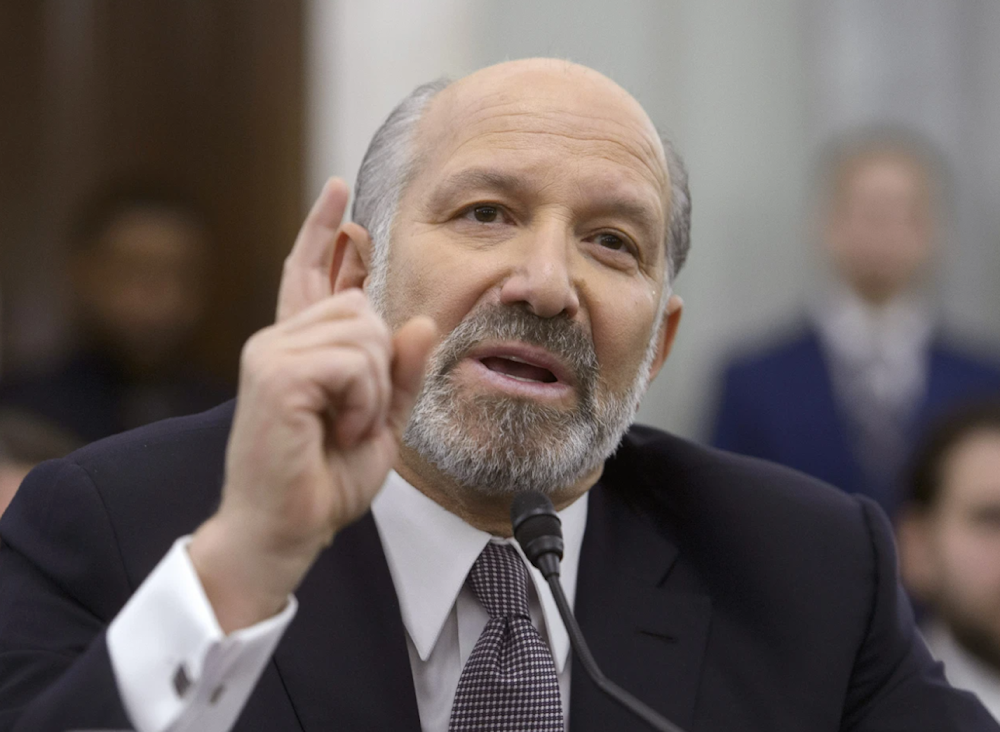Lutnick says semiconductor tariffs likely to come in 'month or two'
The US Commerce Secretary stated that the recent exemption of certain electronic devices from tariffs is temporary, with plans to subject them to "semiconductor tariffs" in the coming months.
-

Howard Lutnick appears before the Senate Committee on Commerce, Science, and Transportation for his confirmation hearing, on January 29, 2025, on Capitol Hill in Washington. (AP)
US Commerce Secretary Howard Lutnick revealed Sunday that the administration's decision Friday night to exempt a range of electronic devices from tariffs imposed earlier this month was only a temporary reprieve, announcing that those items would be subject to "semiconductor tariffs" in "a month or two."
Lutnick told This Week's co-anchor Jonathan Karl that the products are "going to come under semiconductors, and they're going to have a special focus type of tariff to make sure that those products get reshored. We need to have semiconductors, we need to have chips, and we need to have flat panels -- we need to have these things made in America. We can't be reliant on Southeast Asia for all of the things that operate for us."
"So what [President Donald Trump's] doing is he's saying they're exempt from the reciprocal tariffs, but they're included in the semiconductor tariffs, which are coming in probably a month or two. So these are coming soon," he added.
The administration's clarification comes after a US Customs and Border Protection bulletin was issued Friday night outlining which key electronics, including smartphones, computers, solar cells, flat-panel TV displays, and semiconductor-based storage devices, would be exempt from the tariffs announced on April 2.
Such products would be exempt from the hefty tariffs imposed by President Donald Trump on Chinese imports, as well as the worldwide 10% levy.
Lutnick stated on This Week that the White House will establish a tariff model in order to encourage the semiconductor and pharmaceutical industries to relocate to the United States.
"We can't be beholden and rely upon foreign countries for fundamental things that we need," the politician stated. "So this is not like a permanent sort of exemption. He's just clarifying that these are not available to be negotiated away by countries. These are things that are national security that we need to be made in America."
China calls on US to 'completely cancel' reciprocal tariffs
Meanwhile, China demanded the US "completely cancel" its retaliatory tariffs after Washington offered exemptions for consumer electronics and crucial chipmaking equipment.
"We urge the US to... take a big step to correct its mistakes, completely cancel the wrong practice of 'reciprocal tariffs' and return to the right path of mutual respect," a trade ministry official said in a statement.
The tit-for-tat tariff war between the globe's two largest economies has been ongoing since Trump imposed sweeping global tariffs earlier this month, boosting the blanket charge on Chinese imports to 145%.
China imposed 125% retaliatory import taxes on US products on Saturday, defying its largest trading partner. When his tariffs sent global markets into a tailspin, Trump declared a 90-day pause for most countries.
China, however, was exempt from the respite, and, on Friday, the US Customs and Border Protection office said that cellphones, laptops, memory chips, and other items would be exempt from the worldwide tariffs.
On Sunday, Beijing's trade ministry labeled Washington's exclusions a "small step" and said it was "evaluating the impact" of the decision.
The new exclusions will help US tech giants like Nvidia and Dell, as well as Apple, which manufactures iPhones and other high-end products in China.
Trump's reciprocal tariffs have "not only failed to solve any of the United States' own problems, but have seriously undermined the global economic and trade order," according to a statement issued by Beijing's Commerce Ministry on Sunday.
In a call with the World Trade Organization's president on Friday, Commerce Minister Wang Wentao warned that tariffs would "inflict serious harm" on poor countries.
Chinese President Xi Jinping is scheduled for a five-day visit to Southeast Asia, meeting with the leaders of Vietnam, a manufacturing powerhouse, Malaysia, and Cambodia.
It comes after Xi stated China and Europe should "jointly resist unilateral bullying practices," according to official media, during a meeting with the Spanish Prime Minister.
The White House says Trump is still "optimistic" about reaching an agreement with China, while administration officials have made it plain that they expect Beijing to seek out first.

 4 Min Read
4 Min Read










